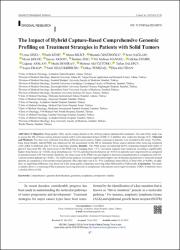The impact of hybrid capture-based comprehensive genomic profiling on treatment strategies in patients with solid tumors

Göster/
Erişim
info:eu-repo/semantics/openAccessAttribution-NonCommercial-NoDerivatives 4.0 Internationalhttps://creativecommons.org/licenses/by-nc-nd/4.0/Tarih
2022Yazar
Dişel, UmutKöse, Fatih
Bilici, Ahmet
Özgüroğlu, Mustafa
Sağlam, Sezer
Şeker, Mesut
Aksoy, Sercan
Tek, İbrahim
Mandel, Nil Molinas
Demir, Gökhan
Arslan, Çağatay
Demiray, Mutlu
Öztürk, Mehmet Akif
Salepçi, Taflan
Eralp, Yeşim
Selçukbiricik, Fatih
Temizaş, Gökçe
Fidan, Ebru Gül
Üst veri
Tüm öğe kaydını gösterKünye
Dişel, U., Köse, F., Bilici, A., Özgüroğlu, M., Sağlam, S., Şeker, M. ... Fidan, E. G. (2022). The impact of hybrid capture-based comprehensive genomic profiling on treatment strategies in patients with solid tumors. Journal of Oncological Science, 8(2), 87-93. https://doi.org/10.37047/jos.2022-89310Özet
Objective: The development of bioinformatics and comprehensive genomic profiling (CGP) has provided insights into the ap-plicability and functionality of the genomic alterations (GA). In this study, we evaluated the impact of CGP on the treatment plan and outcomes in a significant number of patients. Material and Methods: We carried out a retrospective case-control study on 164 adult patients with advanced solid tumors from 15 oncology centers in Türkiye. Results: In all cases, CGP was performed within 23.8 [standard deviation (SD)±32.1] months of initial diagnosis. Non-small cell lung carcinoma, breast cancer, unknown primary carcinoma, colorectal carcinoma, and sarcoma were among the most common tumor types, accounting for 61.5% of all cases. CGP was performed immediately after the diagnosis of advanced cancer in 13 patients (7.9%). In 158 patients (96.4%), at least one GA was found as per the CGP report. Also, in the reports, the average tumor mutational burden (TMB) and GAs were 7.3 (SD±8.7) mut/Mb and 3.5 (SD±2.0), respectively. According to CGP reports, 58 patients had 79 evidence-based drug suggestions for their particular tumor type, whereas 97 patients had 153 evidence-based drug suggestions for another tumor type. After the primary oncologist interpreted the CGP reports, significant changes were made to the treatment of 35 (21.3%) patients. Conclusion: We strongly believe that in the future, high-TMB or other tumor-agnostic biomarkers will become much more afford-able, and CGP will serve as one of the major decision-making tools for the treatment of patients along with pathological, radiological or lab-oratory tests.
Scopus Q Kategorisi
Q4Kaynak
Journal of Oncological ScienceCilt
8Sayı
2Koleksiyonlar
- Makale Koleksiyonu [3770]
- Scopus İndeksli Yayınlar Koleksiyonu [6561]
- TR-Dizin İndeksli Yayınlar Koleksiyonu [2177]


















